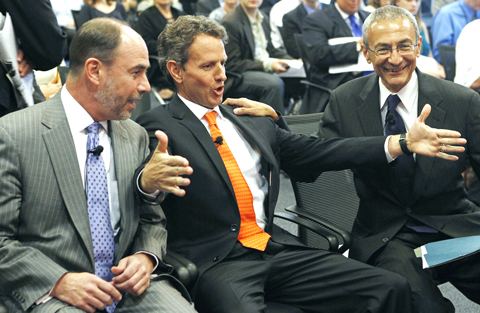US Treasury Secretary Timothy Geithner said on Wednesday that extending tax cuts for the wealthy instituted by former US president George W. Bush would be a US$700 billion mistake. He also rejected a compromise proposal Pbr />
Geithner said cuts for families making more than US$250,000 annually should be allowed to expire on schedule at the end of the year, but the administration believes tax cuts for the 95 percent of taxpayers making less than US$250,000 should be extended.
Geithner’s comments came during a speech at the Center for American Progress and focused on what is likely to be a key economic battle leading up to the November midterm elections. Unless Congress acts, all of the tax cuts approved in 2001 and 2003 will expire at the end of December.

PHOTO: REUTERS
Republicans have argued that all of the tax cuts should be extended. They contend that raising taxes on any group at the current moment would be harmful to the economy.
Geithner said extending the tax cuts for the top 2 percent of taxpayers would cost US$700 billion over a decade and US$30 billion for a single year. He said wealthy families are more likely to save the money, which doesn’t help the economy in the short run.
Geithner said allowing the tax cuts on the wealthy to expire would also help get the soaring deficits under control.
“Borrowing to finance tax cuts for the top 2 percent would be a US$700 billion fiscal mistake,” Geithner said. “It’s not the prescription that the economy needs right now and the country can’t afford it.”
Geithner rejected the argument that all of the tax cuts, including those for the wealthy, should be extended for a couple of years.
He said the money spent on extending the tax cuts for the top 2 percent of taxpayers would not do that much to boost the economy because the wealthy would save a greater proportion of these savings than lower income households, who would spend more of their tax savings, giving a boost to the economy.
He said the economy would get more of a boost by taking the US$30 billion that extending tax cuts for the wealthy would cost for one year and providing increased aid to state and local governments or expanded help for small businesses.
He also said extending tax cuts for the wealthy could burden future administrations with a difficult decision.
“The world is likely to view any temporary extension of the income tax cuts for the top 2 percent as a prelude to a long-term or permanent extension,” Geithner said. “That would hurt economic recovery by undermining confidence that we are prepared to make a commitment today to bring down our future deficits.”

MORE VISITORS: The Tourism Administration said that it is seeing positive prospects in its efforts to expand the tourism market in North America and Europe Taiwan has been ranked as the cheapest place in the world to travel to this year, based on a list recommended by NerdWallet. The San Francisco-based personal finance company said that Taiwan topped the list of 16 nations it chose for budget travelers because US tourists do not need visas and travelers can easily have a good meal for less than US$10. A bus ride in Taipei costs just under US$0.50, while subway rides start at US$0.60, the firm said, adding that public transportation in Taiwan is easy to navigate. The firm also called Taiwan a “food lover’s paradise,” citing inexpensive breakfast stalls

TRADE: A mandatory declaration of origin for manufactured goods bound for the US is to take effect on May 7 to block China from exploiting Taiwan’s trade channels All products manufactured in Taiwan and exported to the US must include a signed declaration of origin starting on May 7, the Bureau of Foreign Trade announced yesterday. US President Donald Trump on April 2 imposed a 32 percent tariff on imports from Taiwan, but one week later announced a 90-day pause on its implementation. However, a universal 10 percent tariff was immediately applied to most imports from around the world. On April 12, the Trump administration further exempted computers, smartphones and semiconductors from the new tariffs. In response, President William Lai’s (賴清德) administration has introduced a series of countermeasures to support affected

CROSS-STRAIT: The vast majority of Taiwanese support maintaining the ‘status quo,’ while concern is rising about Beijing’s influence operations More than eight out of 10 Taiwanese reject Beijing’s “one country, two systems” framework for cross-strait relations, according to a survey released by the Mainland Affairs Council (MAC) on Thursday. The MAC’s latest quarterly survey found that 84.4 percent of respondents opposed Beijing’s “one country, two systems” formula for handling cross-strait relations — a figure consistent with past polling. Over the past three years, opposition to the framework has remained high, ranging from a low of 83.6 percent in April 2023 to a peak of 89.6 percent in April last year. In the most recent poll, 82.5 percent also rejected China’s

PLUGGING HOLES: The amendments would bring the legislation in line with systems found in other countries such as Japan and the US, Legislator Chen Kuan-ting said Democratic Progressive Party (DPP) Legislator Chen Kuan-ting (陳冠廷) has proposed amending national security legislation amid a spate of espionage cases. Potential gaps in security vetting procedures for personnel with access to sensitive information prompted him to propose the amendments, which would introduce changes to Article 14 of the Classified National Security Information Protection Act (國家機密保護法), Chen said yesterday. The proposal, which aims to enhance interagency vetting procedures and reduce the risk of classified information leaks, would establish a comprehensive security clearance system in Taiwan, he said. The amendment would require character and loyalty checks for civil servants and intelligence personnel prior to